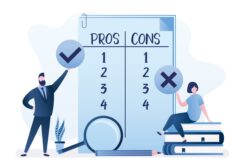A divorce doesn’t have to be a knock-down, drag-out affair with both sides hiring lawyers and heading to court. Divorce mediation can help you avoid court and help resolve family law disputes such as property, child support, alimony, and child custody in the way that works best for your family.
Unlike the adversarial approach that is often taken in divorce litigation, mediation is focused on cooperation rather than confrontation, allowing parties to maintain control over the outcome and avoid the emotional and financial costs of a protracted legal battle.
Choosing the right mediator and preparing fully for the process can help ensure the best possible outcome, allowing you to move forward with confidence and clarity.
The benefits of confidentiality in divorce mediation
Mediation is a facilitative process where the two parties in a dispute will meet with a neutral third party who facilitates the conversation between them and assists them to work together to find a mutually acceptable solution.
It is also a confidential process so anything discussed in mediation can’t be used later in court.
The effectiveness of mediation depends on the ability of the parties to have a frank and open discussion. When they are assured of confidentiality, they are more likely to be more open while brainstorming options, which is an essential part of the mediation. If the parties feel that what they say is likely to be used against them later, it will hamper the success of the mediation.
Why divorce mediation can work for complex family disputes
Reaching an agreement with your former partner can often be difficult and challenging to say the least. With emotions running high, things can get very tense, and you may feel that reaching an agreement is impossible.
Engaging a lawyer at the beginning of the process and adopting an adversarial approach may not be best. It may lead to your former partner becoming more antagonistic as he or she may feel that you are threatening court action.
But contrary to popular belief, most people do not want to go to court and battle it out. They don’t want to have a judge make decisions about their family for them. They prefer to make those decisions themselves and mediation affords them the opportunity to do that.
There is however a school of thought out there that if the disputes are complex, if there is conflict, mediation may not be suitable. On the contrary, those matters may in fact be suitable for mediation as it gives the parties the opportunity to have a discussion in a safe space with the assistance of a facilitator, rather than handing over the matter to a judge to decide for them. If the matters are complex and the issue ends up being litigated, that may be a disaster for the family as they have no control over the outcome.
Mediation is an opportunity to reorganize the family and put agreements in place that work for everyone. In mediation, the parties are able to reach an agreement on their own terms and in their own time and they can keep returning to the mediation table even if an agreement fails the first time. They retain control of the process instead of returning to the courtroom. The parties also have input on their agreement. Mediation is considered to be one of the least invasive interventions when it comes to resolving disputes.
Lawyers offer a different product where they advocate for their clients and are determining a winner or a loser. That means pitting one party against another. This is not ideal for a family when parents are expected to co-parent after the court battle. The culture of divorce is such that clients will hire a lawyer first if they are going through a divorce. However, the better option is to see a mediator first and then hire a “mediation friendly lawyer” to give you legal advice and document the agreement that you reach at mediation.
Mediators are trained in conflict resolution and the mediator can help the two parties have a conversation and manage the conflict. When dividing lives and separating property, the conversation can get heated. Consider mediation for the issues that are hard to resolve and reach agreement on. However, don’t have unrealistic expectations. In mediation you are trying to get to a win-win situation. You may not get everything you want but instead work towards reaching an agreement that you can live with. In mediation, you are looking to the future and making agreements that will work for the family moving forward.

How to hire a mediator who is right for you
Once a decision has been made to go to mediation the next step in the process is to choose a mediator. Mediators take different approaches and have different skill sets so it’s important to choose a mediator carefully and ensure that the person you have chosen has the necessary skills and experience to assist you in your matter.
Some mediators have a legal background, and some have a social science background. It is important that you put some effort into identifying the mediator that will suit your family’s circumstances. You and your former partner may wish to interview a few mediators before finally deciding on who to work with.
Employing a mediator costs significantly less than employing a lawyer. There is a much quicker turnaround, and you’ll be paying less money over a shorter period of time compared to litigation. In most divorce cases, the parties will agree in advance to split the cost of mediation. So, for example, if mediator charges $300 per hour, each party will pay $150.
Once a mediator has been chosen you will be required to sign a mediation agreement before commencing the process. The mediator will meet with each party individually prior to the joint mediation session. This can be done in person or online. This initial meeting can be helpful in building rapport with the mediator and also gives the mediator an opportunity to gather some information about the parties, the nature of the relationship and the issues they are facing. After this meeting, the parties usually feel more comfortable to schedule a private discussion with the mediator and they may feel more at ease going into the joint mediation.
In preparation for the mediation, you and your spouse must gather all relevant information and share it when necessary. The information that must be gathered are generally bank statements, tax returns, details of assets and liabilities, valuations of business and property, and information regarding the children.
How the divorce mediation process works
When the mediation commences, the mediator will brief the parties regarding the ground rules and ask each party to tell their story to the other. Then an agenda is set, in consultation with the parties. The agenda is a list of issues that the parties want to discuss. Once the agenda has been set, the parties are invited to discuss and explore options around each item on the agenda, with a goal to reach an agreement.
It is important that the parties keep an open mind and listen carefully to what the other party is saying, otherwise conflict can escalate. It’s beneficial to be flexible when discussing options. Parties should not get positional in their approach but think outside the box. Tit–for-tat in family law matters does not work.
It is a good idea for each party to consider their goals, values, needs, their plan for the future of the family as well as the needs and wants of the other party in the course of the discussion.
Mediation is most successful when all parties respectfully cooperate to reach a resolution with the facilitation of a neutral mediator.
Tips to ensure you have a successful mediation session
- Be prepared: First things first – make sure mediation is the most appropriate pathway to resolve your issues. Once you’ve decided that it is the best option, schedule an intake with the mediator and make sure you have a rundown from the mediator on how the mediation process works. When you get home after your intake session find a quiet space, grab a cup of coffee and brainstorm – list down all the matters you want to be resolved, the options you have and factors which may hinder you from reaching an agreement. Once you’ve planned this out figure out where you can compromise. Get legal advice before your scheduled mediation date so you have a good understanding of your legal rights and responsibilities.
- Be cooperative: In order for the mediator to have a realistic understanding of the dispute, parties must share information. The goal of mediation is to reach an agreement that works for all parties. This forum also allows each party to voice their concerns and interests which assists in reaching an agreement. Being positional and stuck on one proposal will not result in a good outcome.
- Negotiate and compromise: Remember that the role of the mediator is to facilitate an agreement between the parties in dispute. The mediator does not decide for the parties. Make sure you keep your emotions at the door and focus on common interests. We all know that family matters raise all kinds of emotions so list down your interests in a way that you don’t get carried away during mediation. Think outside the box – create options where all parties’ interests align.
- Treat each other with respect and move past the emotions: Avoid focusing on emotions during mediation when trying to reach a mutual agreement. Decisions based on strong emotions are never the best resolution. Treat each other with respect and practice active listening.
- Reach an agreement in mediation: Any agreement reached involves change so be patient with each other. No one is a fan of change but sometimes it’s inevitable. Take time to reflect on all the interests involved – consider the reality of the situation – consider all possible alternatives. Mediation gives you the freedom to tailor an agreement that works for all parties and suits the needs of your family so you can be as creative as possible. Remember mediation also saves you the money, time, and emotional stress you would have had to deal with, had you decided to go to court.






